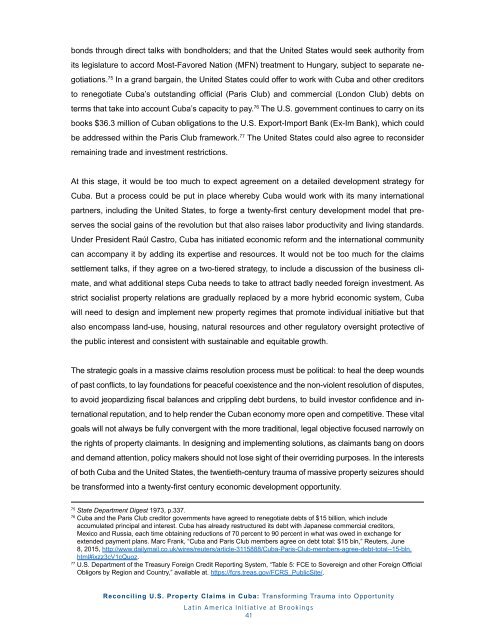Reconciling U.S Property Claims in Cuba
reconciling-us-property-claims-in-cuba-feinberg
reconciling-us-property-claims-in-cuba-feinberg
You also want an ePaper? Increase the reach of your titles
YUMPU automatically turns print PDFs into web optimized ePapers that Google loves.
onds through direct talks with bondholders; and that the United States would seek authority from<br />
its legislature to accord Most-Favored Nation (MFN) treatment to Hungary, subject to separate negotiations.<br />
75 In a grand barga<strong>in</strong>, the United States could offer to work with <strong>Cuba</strong> and other creditors<br />
to renegotiate <strong>Cuba</strong>’s outstand<strong>in</strong>g official (Paris Club) and commercial (London Club) debts on<br />
terms that take <strong>in</strong>to account <strong>Cuba</strong>’s capacity to pay. 76 The U.S. government cont<strong>in</strong>ues to carry on its<br />
books $36.3 million of <strong>Cuba</strong>n obligations to the U.S. Export-Import Bank (Ex-Im Bank), which could<br />
be addressed with<strong>in</strong> the Paris Club framework. 77 The United States could also agree to reconsider<br />
rema<strong>in</strong><strong>in</strong>g trade and <strong>in</strong>vestment restrictions.<br />
At this stage, it would be too much to expect agreement on a detailed development strategy for<br />
<strong>Cuba</strong>. But a process could be put <strong>in</strong> place whereby <strong>Cuba</strong> would work with its many <strong>in</strong>ternational<br />
partners, <strong>in</strong>clud<strong>in</strong>g the United States, to forge a twenty-first century development model that preserves<br />
the social ga<strong>in</strong>s of the revolution but that also raises labor productivity and liv<strong>in</strong>g standards.<br />
Under President Raúl Castro, <strong>Cuba</strong> has <strong>in</strong>itiated economic reform and the <strong>in</strong>ternational community<br />
can accompany it by add<strong>in</strong>g its expertise and resources. It would not be too much for the claims<br />
settlement talks, if they agree on a two-tiered strategy, to <strong>in</strong>clude a discussion of the bus<strong>in</strong>ess climate,<br />
and what additional steps <strong>Cuba</strong> needs to take to attract badly needed foreign <strong>in</strong>vestment. As<br />
strict socialist property relations are gradually replaced by a more hybrid economic system, <strong>Cuba</strong><br />
will need to design and implement new property regimes that promote <strong>in</strong>dividual <strong>in</strong>itiative but that<br />
also encompass land-use, hous<strong>in</strong>g, natural resources and other regulatory oversight protective of<br />
the public <strong>in</strong>terest and consistent with susta<strong>in</strong>able and equitable growth.<br />
The strategic goals <strong>in</strong> a massive claims resolution process must be political: to heal the deep wounds<br />
of past conflicts, to lay foundations for peaceful coexistence and the non-violent resolution of disputes,<br />
to avoid jeopardiz<strong>in</strong>g fiscal balances and crippl<strong>in</strong>g debt burdens, to build <strong>in</strong>vestor confidence and <strong>in</strong>ternational<br />
reputation, and to help render the <strong>Cuba</strong>n economy more open and competitive. These vital<br />
goals will not always be fully convergent with the more traditional, legal objective focused narrowly on<br />
the rights of property claimants. In design<strong>in</strong>g and implement<strong>in</strong>g solutions, as claimants bang on doors<br />
and demand attention, policy makers should not lose sight of their overrid<strong>in</strong>g purposes. In the <strong>in</strong>terests<br />
of both <strong>Cuba</strong> and the United States, the twentieth-century trauma of massive property seizures should<br />
be transformed <strong>in</strong>to a twenty-first century economic development opportunity.<br />
75<br />
State Department Digest 1973, p.337.<br />
76<br />
<strong>Cuba</strong> and the Paris Club creditor governments have agreed to renegotiate debts of $15 billion, which <strong>in</strong>clude<br />
accumulated pr<strong>in</strong>cipal and <strong>in</strong>terest. <strong>Cuba</strong> has already restructured its debt with Japanese commercial creditors,<br />
Mexico and Russia, each time obta<strong>in</strong><strong>in</strong>g reductions of 70 percent to 90 percent <strong>in</strong> what was owed <strong>in</strong> exchange for<br />
extended payment plans. Marc Frank, “<strong>Cuba</strong> and Paris Club members agree on debt total: $15 bln,” Reuters, June<br />
8, 2015, http://www.dailymail.co.uk/wires/reuters/article-3115888/<strong>Cuba</strong>-Paris-Club-members-agree-debt-total--15-bln.<br />
html#ixzz3cV1cQuoz.<br />
77<br />
U.S. Department of the Treasury Foreign Credit Report<strong>in</strong>g System, “Table 5: FCE to Sovereign and other Foreign Official<br />
Obligors by Region and Country,” available at. https://fcrs.treas.gov/FCRS_PublicSite/.<br />
<strong>Reconcil<strong>in</strong>g</strong> U.S. <strong>Property</strong> <strong>Claims</strong> <strong>in</strong> <strong>Cuba</strong>: Transform<strong>in</strong>g Trauma <strong>in</strong>to Opportunity<br />
Lat<strong>in</strong> America Initiative at Brook<strong>in</strong>gs<br />
41


